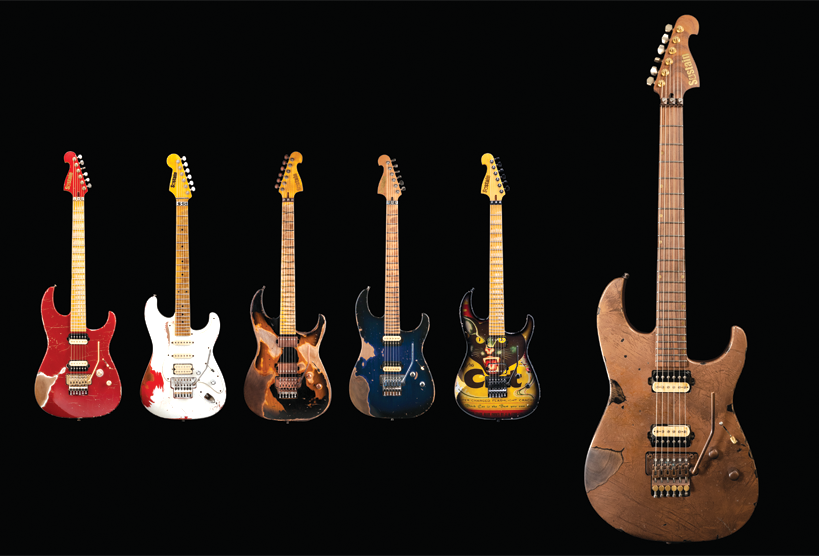NEW DATA THIS MONTH: 2025 Q2 Retail Sales Report
COMPANIES TO WATCH
 |
| Unique features and intensive workmanship define the Sustain Guitars line. |
SUSTAIN GUITARS
Super-custom electric guitar maker with an Italian connection.
IN THE WORLD of boutique electrics, upstart Sustain Guitars represents an uncommon union of U.S. and Italian talents. But multinational manufacture isn’t the company’s only distinction.
Headquartered in Olivenhain, California, Sustain Guitars LLC was established in early 2018. It’s led by guitarist and former music retailer Garett Overstreet and two partners—one a master luthier in Italy, and the other a veteran guitar repair tech. Guitar bodies and necks are manufactured in Tuscany by hand, one at a time, according to the other partners’ CAD specs. Assembly, fretwork, and meticulous set-up are executed in Overstreet’s shop in California. Order fulfillment, from the time the order is placed to the instrument’s arrival at the customer’s door, typically takes four to six months. Excluding some super-premium special orders, Sustain guitars start in the high $3,000s and top out around $4,500.
Growing up in Annapolis, Maryland, one of Overstreet’s first jobs was in the shop of PRS Guitars. (His father, a marine fabricator, made some of the original PRS truss rods.) In the late ’80s he moved to Los Angeles with a “hair metal” band that he says hit the scene “two years too late,” but he played some shows and made friends and connections that would inform his later ambitions.
When rock ’n’ roll stardom eluded him, Overstreet took a couple of decades away from performing to pursue a career selling printed circuit board design and electronic engineering software (with a brief detour into data analytics), and to start a family. When the playing bug hit him again, he purchased a new Jackson. It was a momentous choice, later leading to collaboration with Grover Jackson to design the first prototype Sustain guitar.
In 2015, Overstreet launched and managed Boxcar Guitars, a retail store located in nearby Encinitas. At any given time, Boxcar stocked 40 to 60 guitars, most of them high-end, boutique, and even one-off custom instruments. But aiming high left him wanting. “As a retailer,” he recalls, “I saw supposedly world-class luthiers cutting corners: using cheap Chinese electronics, switches, and pickups, or delivering a $5,000 guitar in a $29 case” so the neck had moved by the time he received it. Combined with his “obsession with tone,” such disappointments and the all-too frequent need to upgrade or tweak even elite-level instruments would indelibly define the company he was about to launch.
A general signature of Sustain guitars is a level of workmanship that Overstreet rarely saw in even the boutique brand instruments shipped to Boxcar. More specific distinctions include two patent-pending features that exemplify his tone and design priorities: The Sustain Switch is a spring-loaded tone knob. In the “up” position, no matter what other pickup configuration is selected, a wide-open humbucker mode is engaged, bypassing all internal circuitry and sending the signal directly to the output. Though it does deliver a modest dB boost, the device is primarily used for a sudden tone enhancement. “It’s essentially an enhanced blower switch,” Overstreet explains. “Instead of stepping on an overdrive pedal, you just bang on the Sustain Switch.”
The line’s other patent-pending feature is the incorporation of brass in each instrument’s headstock, neck, and the neck’s connection to the body. Though there may have been a genetic link to Overstreet’s metallurgist father, he was inspired to employ yellow brass knowing that it’s the principal material of more than half the instruments in an orchestra. He wondered, “Why are we using the cheapest metals like zinc and pot metal on electric guitars” when brass is suitably malleable, aesthetically beautiful, and inherently “musical”? Individual brass letters spelling out “SUSTAIN” are flush-mounted into the headstock. Along with 8mm brass fret inlays, they provide a precisely measured counterweight for the instrument’s balance. Other brass appointments include the neck joint plate, tremolo block, machined control knobs, and strap lock. A combination brass and carbon fiber truss system reinforces the neck, and brass dowels, in concert with machine screws and brass anchors, connect the guitar’s neck to the body, promoting vibration transfer to the pickups and overall body resonance. (The company’s slogan is “Resonation Through Innovation.”) Brass, Overstreet explains, is used “not everywhere we could, as a gimmick, but everywhere it will be a real enhancement.” Describing the material’s aesthetic appeal, he adds, “You can polish it and make it look like the day you bought it, or you can let it age to a beautiful aqua blue patina.” For those who can’t wait for the vintage look, Sustain can expedite the process at the shop before the instrument is delivered to the customer.
Sustain’s unorthodox Italy-U.S. production model limits its output, but Overstreet’s initial goal is to complete a dozen to 15 guitars per month. (This projection excludes super-customized, ultra-premium instruments such as the one recently commissioned by Elijah Blue Allman, which took seven months to complete.) He is encouraged by early interest and reviews, and by a couple of customers purchasing more than one instrument. “We’re getting a lot of green lights,” he says, “and the [guitarist] community response has been amazing.”
Every Sustain guitar is custom ordered from a vast á la carte menu of options including everything from capacitor brands, potentiometers, jacks, and even the type of wire shielding, to bridges, tuners, and tremolos, to custom-machined brass control knobs, to long lists of wood types for the body, neck, and fretboard. Typical high-end appointments include German ABM tremolos and bridges (made of brass and high-grade steel) and recommended custom-tweaked Wolftone pickups. Standard features include an angled, curved, and beveled neck joint, use of machine screws (rather than wood screws) for a more solid bolt-on neck joint, and an ultra-thin satin nitro finish. In finishes and graphics, pretty much anything goes; the company’s one requirement is that 20% to 25% of the original body wood remains exposed, protected only with a light oil, “to let the body breathe.”
Each completed instrument is hung for a week in optimal humidity, under tension, strung with the customer’s chosen gauge of strings, all to ensure that the action, intonation, and feel are perfect from the moment the customer first touches it. Sustain guitars are shipped in customized SKB cases equipped with Boveda humidity packs and a hygrometer.
For Overstreet, the reward for this fanatical attention to detail is freedom from compromise. And for his customers, it’s “a guitar that even the most discerning player can custom order and never have to upgrade anything.”
www.sustainguitars.com

The leading SOURCE OF DATA & ANALYSIS SINCE 1890
© 2018 Music Trades Corporation. All Rights Reserved



 Contact Us
Contact Us



 TO ALL FEATURES
TO ALL FEATURES